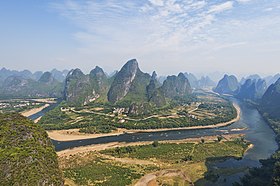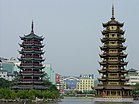
Back Guangxi ACE Guangxi Afrikaans قوانغشي Arabic Guangxi AST Quansi-Çjuan Muxtar Rayonu Azerbaijani Гуансі-Чжуанскі аўтаномны раён Byelorussian Kengsé BEW Гуанси-джуански автономен регион Bulgarian কুয়াংশি Bengali/Bangla ཀོའོང་ཤི་ཀྲོང་རིགས་རང་སྐྱོང་ལྗོངས། Tibetan
You can help expand this article with text translated from the corresponding article in Chinese. (July 2014) Click [show] for important translation instructions.
|
Guangxi
广西 | |
|---|---|
| Guangxi Zhuang Autonomous Region | |
| Chinese transcription(s) | |
| • Pinyin | Guǎngxī zhuàngzú zìzhìqū |
| • Jyutping | Gwong2 sai1 Zong3 zuk6 Zi6 zi6 keoi1 |
| • Abbreviation | 桂 (Guì; Gwai3) |
| Zhuang transcription(s) | |
| • Standard Zhuang | Gvangjsih Bouxcuengh Swcigih |
| • Abbreviation | Gvei |
Clockwise from the top:
| |
 Location of Guangxi within China | |
| Country | China |
| Named for |
|
| Capital (and largest city) | Nanning |
| Divisions | 14 prefectures, 109 counties, 1396 townships |
| Government | |
| • Type | Autonomous region |
| • Body | Guangxi Zhuang Autonomous Regional People's Congress |
| • CCP Secretary | Liu Ning |
| • Congress Chairman | Liu Ning |
| • Government Chairman | Lan Tianli |
| • CPPCC Chairman | Sun Dawei |
| Area | |
| • Total | 237,600 km2 (91,700 sq mi) |
| • Rank | 9th |
| Highest elevation | 2,141 m (7,024 ft) |
| Population (2020)[1] | |
| • Total | 50,126,804 |
| • Rank | 11th |
| • Density | 210/km2 (550/sq mi) |
| • Rank | 20th |
| Demographics | |
| • Ethnic composition | |
| • Languages and dialects | Zhuang, Yue languages (mainly Cantonese), Southwestern Mandarin, Pinghua |
| ISO 3166 code | CN-GX |
| GDP (2021) | CN¥2.474 trillion(US$383 billion; (19th)[2] |
| GDP per capita | CN¥49,118 (US$7,611 (31st) |
| GDP per growth | |
| HDI (2019) | high · 25th |
| Website | (in Chinese) Guangxi Zhuang Autonomous Region |
Guangxi,[a] officially the Guangxi Zhuang Autonomous Region, is an autonomous region of the People's Republic of China, located in South China and bordering Vietnam (Hà Giang, Cao Bằng, Lạng Sơn, and Quảng Ninh Provinces) and the Gulf of Tonkin. Formerly a province, Guangxi became an autonomous region in 1958. Its current capital is Nanning.[5]
Guangxi's location, in mountainous terrain in the far south of China, has placed it on the frontier of Chinese civilization throughout much of Chinese history. The current name "Guang" means "expanse" and has been associated with the region since the creation of Guang Prefecture in 226 AD. It was given provincial level status during the Yuan dynasty, but even into the 20th century, it was considered an open, wild territory. The abbreviation of the region is "桂" (Hanyu pinyin: Guì; Zhuang: Gvei), which comes from the name of the city of Guilin, the provincial capital during both the Ming dynasty and the Qing dynasty.
Guangxi contains the largest population of China's ethnic minorities after Yunnan, in particular, the Zhuang people, who make up 34% of the population. Various regional languages and dialects such as Pinghua, Zhuang, Kam, Cantonese, Hakka, and Min are spoken alongside Mandarin Chinese.[6]
- ^ "Communiqué of the Seventh National Population Census (No. 3)". National Bureau of Statistics of China. 11 May 2021. Retrieved 11 May 2021.
- ^ GDP-2021 is a preliminary data "Quarterly by Province" (Press release). China NBS. 1 March 2022. Retrieved 23 March 2022.
- ^ "Sub-national HDI". globaldatalab.org. Retrieved 17 April 2020.
- ^ "常用國字標準字體筆順學習網". Archived from the original on 21 December 2016. Retrieved 7 December 2016.
- ^ The Yearbook of China's Cities. Yearbook of China's Cities Publishing House. 2006. p. 327.
- ^ "Zhuang Minority & Yao Minority in Guangxi Zhuang Autonomous Region". www.chinadiscovery.com. Archived from the original on 13 September 2017. Retrieved 11 June 2019.
Cite error: There are <ref group=lower-alpha> tags or {{efn}} templates on this page, but the references will not show without a {{reflist|group=lower-alpha}} template or {{notelist}} template (see the help page).
© MMXXIII Rich X Search. We shall prevail. All rights reserved. Rich X Search





